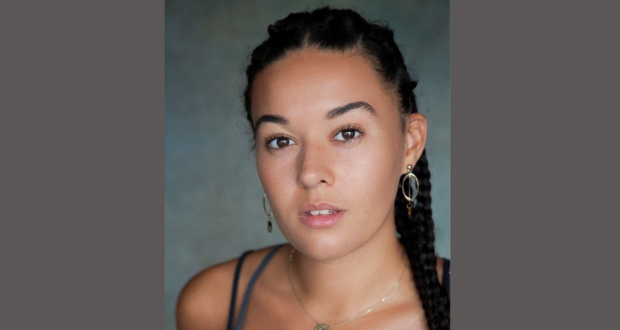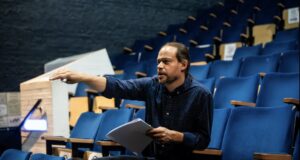Iris Theatre, located at The Actors Church in Covent Garden, is always a joyful place to visit, especially when the sun is out. Their summer season promises more great shows presented outside in the churches wonderful gardens. One of which is Shoes To Fill. So it seemed a good chance to catch up with writer Tanya Bridgeman to find out more about having your debut show performed in such a lovely location and the strong woman who inspired her to write it.
First things first, what’s Shoes To Fill all about then?
Shoes to Fill is about a young, mixed woman of Bajan and Irish heritage who is trying to find herself. At the start of the play she struggles with her mental health and all of her shoes go missing, leaving her confined to her bedroom. She uses the stories that her grandmothers tell her to escape from her sense of entrapment and find freedom in being who and what she wants to be. She fights against the imposter in her head to take up space and thrive for a fulfilling life as her grandmothers taught her.
The play draws on both Irish and Bajan culture, what were the reasons in using those two?
My Grangran is Bajan and my Granny is Irish. Both women had a huge impact on my life in different ways. I grew up hearing their stories and have always thought that these are stories worth sharing.
These cultures are my personal heritage, and I do not think there has ever been a character specifically written with this in mind. I started writing because I want to create more roles for black and mixed actors, I want these roles to be specific so that everyone can see themselves reflected on the stage. For me it is about getting specific, my mix of Bajan and Irish heritage play a huge role in how I relate to the world, this would differ from a person of Greek and Trinidadian heritage. Culture runs through our veins and makes us see things differently from our neighbours. From the food we eat, to how we socialise, a lot of this stuff is ingrained from cultural traditions passed down to us.
The story features a character only known as “Granddaughter”, but appears to never be named, is there a reason for this approach?
Granddaughter is unnamed because I want her to remain relatable. Pretty much everyone has a shared experience of being a grandchild or hearing stories from older relatives, and although the story is specific to someone of a mixed heritage there is something powerful in knowing that a lot of people can connect to this character. Not everyone will relate to everything but hopefully they will relate to just one experience or emotion expressed by granddaughter.
The play promises spoken word and elements of music; are these genres you have explored previously? Did you start with the idea of using them or did they develop as you wrote the play?
I wanted to use spoken word and music when I set out to write Shoes to Fill. When I started my writing journey a lot of what I was writing was spoken word, as I feel like this is a really freeing form to write in. I enjoy rhythm, flow, and rhyme and this is something I wanted to incorporate into the play. I also feel like spoken word has less rules. I’m not, and have never been, great at grammar and structure but by using a form such as spoken word I’m able to just let the words just fall out of me. –(sounds cringe I know! But it’s true!)
For the elements of music, firstly- I just love moving and singing to music – in particular, the bass of a song. But music also encapsulates different cultures so well and to transport audiences to the worlds of Granny and Grangran music was always going to lend a helping hand! Plus, music is fun and can move us in so many ways, it can make us sad, happy, angry, determined!
There is a very feminine focus to things – granddaughter and grandmothers all get mentioned – was it a conscious effort to focus on the female side of family and culture?
Yes, this was a conscious effort! The Grandmother/Granddaughter relationship is so precious, and I wanted to highlight this. Also, Granddaughter is 26 and this whole idea of womanhood across different generations is really interesting. By the time both of my grandmothers where this age they had migrated to England, were married, had jobs, had homes and had children and the conversation around milestones in a woman’s life is a theme that the play looks at.
The play is being performed in the gardens of The Actors Church, does performing outside require a different approach to the final draft of the play?
The play has been written especially for an outside space! When we were awarded the Iris seed commission, I only had a rough draft of what the play was going to look like- so I have been able to write with this in mind. The biggest change in approach that we are having to keep in mind is the fact that we cannot use lighting to create atmosphere. But within the writing there is a sense of the classic, ‘’black out’’ or ‘’scene change’’. Getting creative with words and not relying on lighting has taken us back to the foundation of theatre.
You are part of Soho Theatre Writers Lab, how did you get involved in that and how has it helped you develop your writing?
I only started writing over the first lockdown, having not really written creatively since secondary school (ten years ago – gross!) A friend told me about Soho Writers Lab, and I had a piece ready to send in but did not really expect to gain a place. But I did earn a place and it has been so great! It has firstly giving me the confidence to say that I am a writer. I have learnt so much about structure, different techniques, ways of unlocking ideas and all the different forms that plays can be written in. I am learning and absorbing so much information that is aiding my skills as an artist. Being able to read some amazing plays by other amazingly talented new writers is so inspiring and really pushes me to produce my best work.
As well as Shoes to Fill I am writing another play which I am getting feedback for through the Soho writers lab and although the plays are separate, I can apply the dramaturgical advice to both. Doing so I can break down the play and really push the narrative to an exciting place.
So, how does it feel knowing your debut play is all set to be unleased upon the world?
Brilliant! I cannot wait to share Shoes to Fill with an audience. It’s a really fun piece and we have a lot of surprises in store! Also Shoes to Fill is not only my debut play as a writer but the debut show of my production company FAIR PLAY. It’s so exciting to see everything coming together and years of hard work paying off. Eeeakkk so many emotions right now!
================================================
Thanks to Tanya for her time in chatting to us. Shoes To Fill will be playing in the gardens of The Actors Church in Covent Garden between 5 and 10 July. Further details and booking via the below link.
 Everything Theatre Reviews, interviews and news for theatre lovers, London and beyond
Everything Theatre Reviews, interviews and news for theatre lovers, London and beyond



